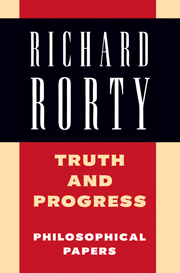Book contents
- Frontmatter
- Contents
- Introduction
- I Truth and Some Philosophers
- 1 Is Truth a Goal of Inquiry? Donald Davidson versus Crispin Wright
- 2 Hilary Putnam and the Relativist Menace
- 3 John Searle on Realism and Relativism
- 4 Charles Taylor on Truth
- 5 Daniel Dennett on Intrinsicality
- 6 Robert Brandom on Social Practices and Representations
- 7 The Very Idea of Human Answerability to the World: John McDowell's Version of Empiricism
- 8 Antiskeptical Weapons: Michael Williams versus Donald Davidson
- II Moral Progress: Toward More Inclusive Communities
- III The Role of Philosophy in Human Progress
- Index
1 - Is Truth a Goal of Inquiry? Donald Davidson versus Crispin Wright
Published online by Cambridge University Press: 06 July 2010
- Frontmatter
- Contents
- Introduction
- I Truth and Some Philosophers
- 1 Is Truth a Goal of Inquiry? Donald Davidson versus Crispin Wright
- 2 Hilary Putnam and the Relativist Menace
- 3 John Searle on Realism and Relativism
- 4 Charles Taylor on Truth
- 5 Daniel Dennett on Intrinsicality
- 6 Robert Brandom on Social Practices and Representations
- 7 The Very Idea of Human Answerability to the World: John McDowell's Version of Empiricism
- 8 Antiskeptical Weapons: Michael Williams versus Donald Davidson
- II Moral Progress: Toward More Inclusive Communities
- III The Role of Philosophy in Human Progress
- Index
Summary
Pragmatists think that if something makes no difference to practice, it should make no difference to philosophy. This conviction makes them suspicious of the distinction between justification and truth, for that difference makes no difference to my decisions about what to do. If I have concrete, specific doubts about whether one of my beliefs is true, I can resolve those doubts only by asking whether it is adequately justified – by finding and assessing additional reasons pro and con. I cannot bypass justification and confine my attention to truth: assessment of truth and assessment of justification are, when the question is about what I should believe now, the same activity. If, on the other hand, my doubts are as unspecific and abstract as Descartes's – are such that I can do nothing to resolve them – diey should be dismissed, with Peirce, as “make-believe.” Philosophy should ignore them.
This line of thought suggests to pragmatists that, although there is obviously a lot to be said about justification of various sorts of beliefs, there may be little to say about truth. The sort of thing philosophers typically have said – that truth is some sort of correspondence to, or accurate representation of, reality – seemed empty and poindess to many nineteenth-century idealists, and also to Dewey. The early pragmatists agreed with their idealist opponents that doubts about correspondence to reality can be settled only by assessing the coherence of the dubious belief with other beliefs. To bodi, the difference between true beliefs considered as useful nonrepresentational mental states, and as accurate (and therefore useful) representations of reality, seemed a difference that could make no difference to practice.
- Type
- Chapter
- Information
- Truth and ProgressPhilosophical Papers, pp. 19 - 42Publisher: Cambridge University PressPrint publication year: 1998
- 28
- Cited by



